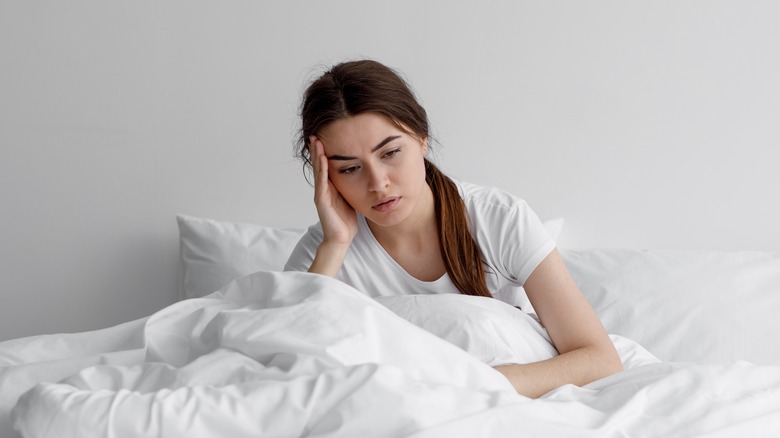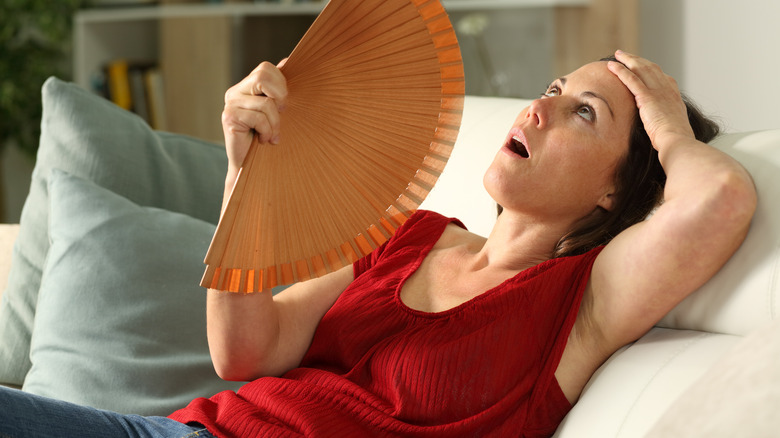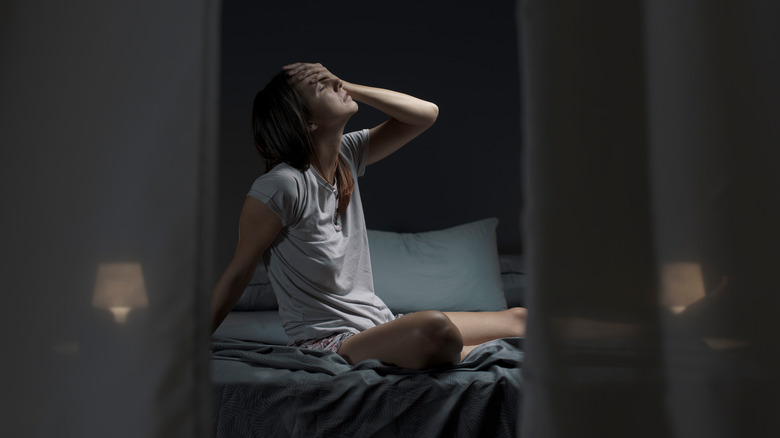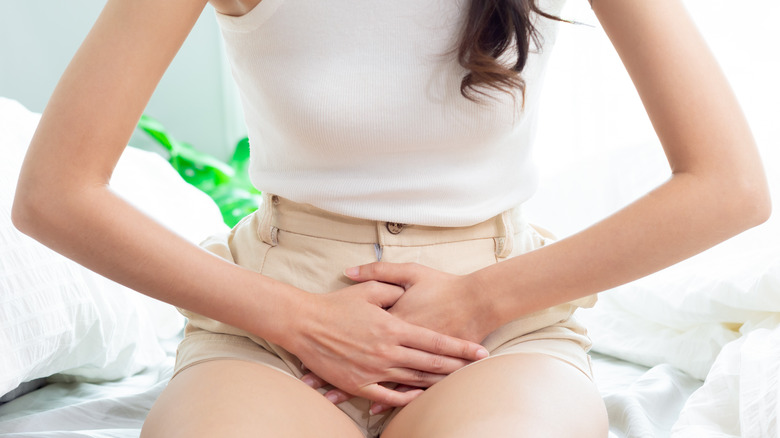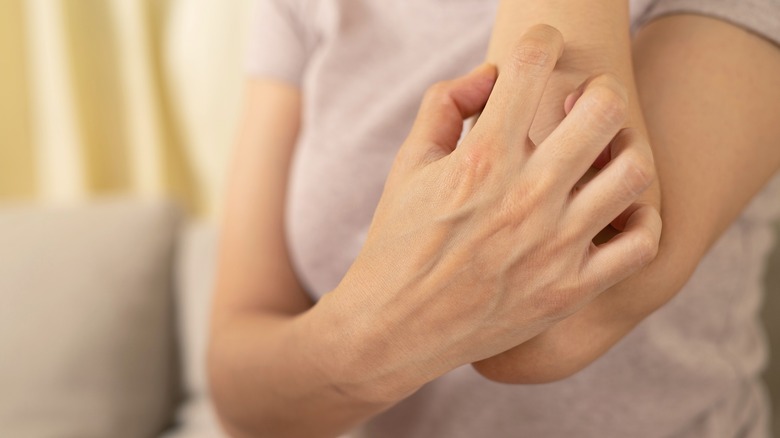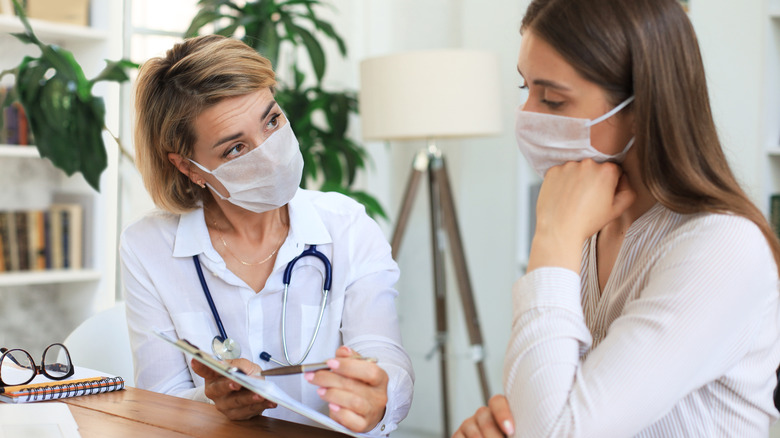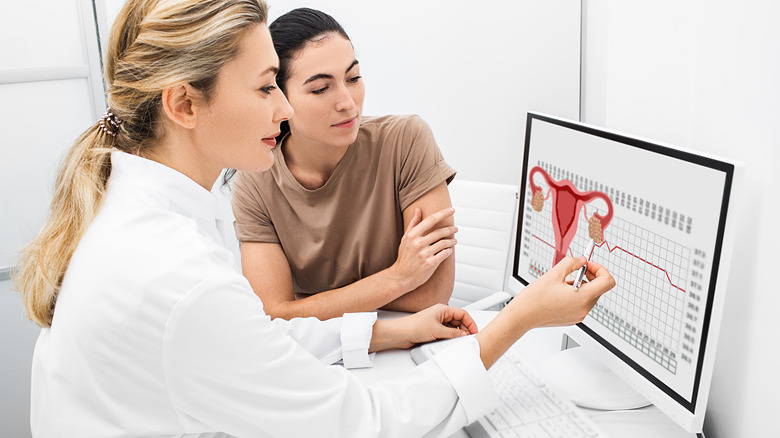Signs You Might Be Headed Toward Early Menopause
While most women hit menopause in their 50's, 5% of women experience this milestone before the age of 45 (via Cleveland Clinic). According to the National Institute on Aging, a woman has not reached menopause until 12 months after her last period (menses). Early menopause is defined as reaching this milestone before the age of 45; premature menopause occurs before the age of 40 (via Cleveland Clinic). The transitional years leading up to this milestone may be marked with changes in monthly cycles, hot flashes, and various other symptoms related to hormonal fluctuations. This journey in a woman's life is known as the menopausal transition, or perimenopause.
To be clear, there are three stages of menopause (via UMPC Health Beat). The first is perimenopause, which typically occurs between the ages of 45 and 55. It can last from 7 to 14 years. During this time, both estrogen and progesterone levels fluctuate greatly (via National Institute on Aging). And while you may miss a period or two during this time, it is important to note you can still get pregnant, according to UMPC Health Beat. The second stage, what we refer to as menopause, marks the point where a woman is officially no longer experiencing a monthly cycle (12 months post last menses). At this point, estrogen levels are very low (via Cleveland Clinic). And the third stage, post-menopause, is the period following menopause where estrogen levels may continue to decline, prolonging symptoms even after one has reached menopause (via UMPC Health Beat).
Causes of early menopause
So, you are not quite 45 and your periods have declined significantly or stopped entirely over the course of a year — welcome to early menopause (via the National Health Service). Early menopause can happen when your ovaries stop working (aka primary ovarian insufficiency). This may be a result of genetic mutations such as Turner's Syndrome, an autoimmune disease, or it may simply run in your family (i.e., genetics). Radiation and chemotherapy can also lead to primary ovarian insufficiency (though it can be temporary). And hysterectomies in which the ovaries are removed will also bring upon early menopause.
Of those with early menopause, 60% have idopathetic premature menopause with no identifiable cause (via Better Health Channel). As many as 30% of women with early or premature menopause have an affected female family member. And 10-30% have autoimmune disorders such as Crohn's disease, systemic lupus, hyperthyroidism, or rheumatoid arthritis.
Other factors associated with the early onset of menopause include cigarette smoking, race, oral contraception, depression, age at menarche, and anthropometrics (i.e., body weight and proportion), according to a 2000 review in Maturitas. Underweight women are at increased risk for early menopause, according to a 2022 study in the Journal of American Heart Association. Early menarche — or starting one's period on or before the age of 11 — is a risk factor for both early and premature menopause, according to a 2017 article in Human Reproduction.
Can diet affect time of menopause?
It is not clear how much diet has an influence on the age of your menopause. But a U.K. study suggests that a high-carb diet might contribute to early menopause, pushing it forward to about one and a half years earlier the average age of 51, according to BBC News. The same study found that a diet rich in oily fish and legumes (peas and beans) might delay menopause. A possible explanation, say the researchers, is that legumes contain antioxidants, which may preserve menstruation for a longer period of time. There is also some evidence suggesting a link between dairy consumption and reduced risk of premature menopause (via Healthline). However, observational studies are limited and cannot provide a direct causal relationship (via BBC News).
And while it cannot be decisively concluded that diet influences early or late menopause, there is evidence that certain foods may relieve menopausal symptoms such as bone loss and sleep disorders, according to Healthline. Dairy foods provide nutrients essential for bone health, including calcium, phosphorus, and vitamin D. It is also suggested that dairy foods may improve sleep function.
Hot flashes
If your periods are fluctuating or starting to decline, you may find yourself a bit hot around the collar or noticeably flushed. Hot flashes are one of the most common symptoms of menopause (via Johns Hopkins Medicine). It occurs in about 75% of women experiencing menopause. Hot flashes are defined as brief, intermittent heated episodes affecting the face, upper neck, and chest, according to a 2013 review in Annals of Medical & Health Sciences Research. They are often unpredictable, sudden, and intense. While some women experience hot flashes for up to two years, others may live with them for 10 years or more (via The North American Menopause Society). And because they appear to be directly related to declining levels of estrogen, the severity or intensity can vary from woman to woman (via Johns Hopkins Medicine).
Although hot flashes may only last from two to five minutes, they can affect the quality of a woman's life, according to the 2013 review. These uncomfortable heated sensations can be disruptive to a women's daily routine, per the National Institute on Aging. Furthermore, hot flashes are also associated with increased anxiety and heart palpitations (via Annals of Medical & Health Sciences Research).
Night sweats
When hot flashes occur at night, they are called night sweats (via the National Institute on Aging). These occurrences can make it difficult to get a good night's sleep. It's an intense heated sensation that can awaken you with a sudden jolt (via Johns Hopkins Medicine). Because they keep you up, you may likely feel fatigued, moody, and a bit fuzzy on the days that follow your sweat-laden, sleepless nights.
Keeping a fan on, sleeping in light clothing (natural fibers versus synthetic materials), and keeping a change of clothes nearby can help keep you cool. You may also want to keep some cooling face wipes nearby to swipe away sweat. Avoiding common triggers like coffee, red wine, and spicy food may be helpful. And reviewing your medications with your physician is important, because there are some blood pressure and cholesterol medications for which hot flashes as a known side effect.
Vaginal and urinary tract symptoms
Whether you constantly have to pee or you are finding it dry and uncomfortable down there, it may be a sign you are going through menopause (via The American College of Obstetricians and Gynecologists). Shifting hormonal levels, in particular declining levels of estrogen, can cause dryness to many parts of the body — including the vulva and vaginal lining (via North American Menopause Society). It also causes these areas to become more delicate and less flexible. Fragile, dry vaginal tissues are more prone to injury, tearing, and bleeding during intercourse. Reduced estrogen also increases vaginal pH, making it less acidic. According to Healthline, increased vaginal pH — above the normal range of 3.8 to 4.5 — can lead to infections. This can also result in itchiness and burning during urination.
Some women experience increased urinary frequency as well as urinary tract infections (via The American College of Obstetricians and Gynecologists) during their menopausal transition. When this occurs during menopause in conjunction with vaginal dryness, it is known as genitourinary syndrome of menopause.
Difficulty sleeping
Sleep disturbances aren't uncommon during the menopausal transition, according to Women's Health Concern (WHC). Statistics show that 28-63% of menopausal women are affected. And it may be no surprise that much of the difficulty sleeping is related to waking up in a sweat (i.e., night sweats). Anxiety and depression are also factors, say the experts at WHC. Declining estrogen levels which can lead to nightly hot flashes can also elicit emotional distress, which can both make it hard to fall asleep at night and diminish the overall quality of sleep. And because low levels of estrogen also may lead to achy joints and bladder problems, issues such as soreness, pain, and frequent urination will also make it difficult to get those zzzs. The good news is that there are some relatively simple things you can do to improve the quality of your sleep during this milestone of your life, including implementing regular exercise, unplugging an hour before bed, and setting a consistent bedtime (via Johns Hopkins Medicine).
Anxiety and depression
Anxiety is no joke, and neither is depression. Both can affect your daily routine and interrupt your sleep. And unfortunately, those hormonal changes that lead up to menopause not only affect your mood, but may also lead to bouts of anxiety and depression (via NPR). A significant number of women in early stages of perimenopause may experience depression, according to NPR. Anxiety and panic attacks are also more common during this transitional time. Women at greater risk for mental anguish during menopause are those with a history of mental health issues such as post-partum depression and those who experienced more severe bouts of PMS (premenstrual syndrome), according to Jennifer Payne, director of the Women's Mood Disorders Center at Johns Hopkins University, as interviewed for NPR.
And while menopause-triggered anxiety can keep you up at night (via Women's Health Concern), it may also affect your morning routine (via Gennev). Decreases in estrogen can cause rises in the stress hormone cortisol, which stimulates one's nervous system, causing anxiety upon waketime, explains psychiatrist Swapna Vaidya to Gennev.
Studies show that 25% of women between the ages of 40 and 50 report frequent anxiety. However, the increased risk for depression in the perimenopausal years tends to taper post-menopause.
Reduced sex drive
If you are having sex less often, does that mean you are more likely to reach early menopause? A 2020 study published in Royal Society Open Science suggested that infrequent sex around your mid-forties may influence reduction in ovulation — hence leading toward a menopausal transition sooner, according to WebMD. In the study, researchers found that of the 3,000 45-year-old women reportedly "having less sex" (less than once per month), 46% were starting to experience perimenopausal symptoms. However, this does not indicate a cause-effect relationship, according to the authors, and more research is needed to confirm a potential link.
What can be said, however, is that reduced sex drive is a common symptom of menopause (via National Institute on Aging). When estrogen starts to decline, so does one's sexual desire (via Johns Hopkins Medicine). During this time, vaginal tissues start to get dry and irritated, making sex less comfortable (and potentially painful). In fact, more than 30% of women transitioning through menopause report sexual discomfort and lack of arousal. And if you are already have chronic health issues that affect your energy, physical ability, and self-image, your sex drive will likely take a nosedive as well.
Itching
Do you find yourself itching all over for no apparent reason? This may be a sign you are headed toward menopause. That is because estrogen is related to collagen, which adds to your skin's integrity (via Healthline). Collagen also supports your skin's natural oil production to keep it soft and well-hydrated. Hence, drier, weaker skin is a natural consequence of declining estrogen. Common areas of itching related to menopause include the face, neck, chest, arms, legs, and back.
While perimenopausal skin changes are permanent, there are some things you can do to promote more moisture and keep your skin fresh (via WebMD). Include healthy fats in your diet. These include omega-3s that are found in foods such as salmon, walnuts, flaxseeds, seaweed products, and soy. Several small studies have shown improvement in skin hydration, scaliness, and roughened texture within 12 weeks of daily omega-3 intake, according to a 2021 review in Dermatology Practical & Conceptual. And don't forget to wear sunscreen to protect from those skin-damaging UV rays (via WebMD).
Problems with memory and concentration
Memory issues can occur post-pregnancy — often referred to as "mom brain" (via What to Expect). And when memory problems late in life, the prognosis may be dementia (via Alzheimer's Society). But when it occurs around the time a woman is experiencing hot flashes and other symptoms related to perimenopause, it may also be a sign that menopause is near (via The Guardian).
Hormone-related brain fog may occur in response to declining progesterone and estrogen levels, and might be related to how the brain responds to those hormonal fluctuations. Declining progesterone levels can contribute to mood swings, sleep deprivation (which on its own can affect one's memory), and brain fog. Estrogen losses are also related to moodiness and a confused brain.
And did you know that hot flashes may have an impact on memory performance? Though research is scant, a couple small studies on women suggested that the frequency of hot flashes was significantly related to memory recall and performance, according to 2014 review in Integrative Medicine Insights. Possible reasons may include changes in blood flow to the temporal lobe and increases in the stress hormone cortisol, which affects the hippocampus, according to the researchers. The hippocampus is a structure embedded in the temporal lobe which plays a role in learning and memory (via 2012 article in Annals of Indian Academy of Neurology). And also, sleep losses due to night sweats may impact memory, as well (via Integrative Medicine Insights).
Associated health consequences
Early menopause effects 5% of women under the age of 45, and premature menopause occurs in just 1% of women under 40 years of age (via Cleveland Clinic). One in 1,000 women reaches menopause before the age of 30 (via Better Health Channel). And unfortunately, going through menopause at an earlier-than-average age puts these women at an elevated risk of developing certain other health conditions.
Infertility is a major outcome for those undergoing premature- or early menopause (via Cleveland Clinic). Although, according to Southern California Reproductive Center, IVF and donor eggs may be a solution for those experiencing infertility. Women who have early or premature menopause are also have a higher chance of developing neurological dysfunction, osteoporosis, heart disease, and earlier mortality, according to a 2013 review in Annals in Medical & Health Sciences Research. The earlier the age, the higher the risk for adverse outcomes affecting a woman's long-term health, according to a 2010 review in Maturitas. However, estrogen treatment near the onset of menopause may help offset some of these consequences. Other hormonal therapies may also be necessary, say the researchers (via Maturitas).
Diagnosis
If you are experiencing menopausal symptoms before the age of 45, it is important to seek medical advice to discuss treatment for symptoms as well as a plan to stave off other health conditions like osteoporosis and heart disease for which early menopause puts you at higher risk (via NHS).
Take note of irregular periods and heavier- or lighter-than-usual flow, as this can indicate your ovaries are producing less estrogen (via WebMD). Medical tests can rule out other conditions including pregnancy or thyroid disease and indicate whether or not menopause is a concern. If your estradiol (a form of estrogen) levels are below 30, it is a sign you are entering menopause. And when estrogen is low, your follicle-stimulating hormones (FSH) — which prompt estrogen production by the ovaries — increase, so FSH levels above 40 mIU/mL are a likely indicator of menopause as well. Based on your family history, blood tests to determine hormonal levels, and your symptoms, your physician can make a diagnosis and refer you to a specialist if necessary (via NHS).
Treatment
Treatment for early and premature menopause is similar to that of natural menopause, and involves managing symptoms, addressing emotional needs, and considering the added health risks caused (via WebMD). Estrogen is protective against heart disease (via Cleveland Clinic), hence women experiencing menopause early spend a greater portion of their lifespan without its protective benefits (via WebMD). Early menopause also puts these women at greater risk for osteoporosis, colon cancer, and dental problems. And this is all in addition to pesky symptoms such as hot flashes, vaginal dryness, and mood problems.
Hormone replacement therapy (HRT) is typically recommended to women undergoing premature menopause, unless medically contraindicated (via Cleveland Clinic). HRT may improve blood flow, reduce menopausal symptoms such as hot flashes, and reduce risk for osteoporosis (via Cleveland Clinic). However, there is some evidence to suggest that HRT can contribute to an increased risk for heart attack, stroke, and possibly breast cancer.
Because HRT also has risk factors, it is a carefully medically-weighed decision that may be recommended for only short-term usage. Other methods of treatment involve lifestyle measures that reduce heart disease risk. These include avoiding or quitting smoking, achieving an ideal body weight, exercising at least 30 minutes for three to five times a week, maintaining a plant-rich diet that is low in saturated fat and high in fiber, and medical treatment for diabetes, high blood pressure, or cholesterol if needed. Counseling and support groups can help with emotional needs (via NHS).


